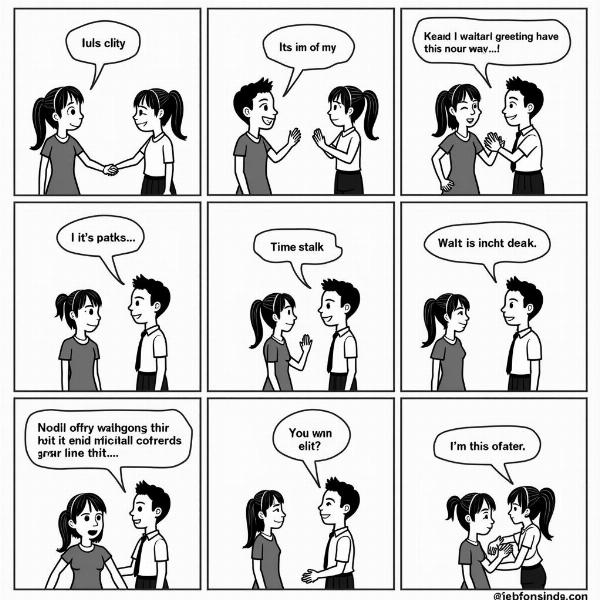Understanding the nuances of conversational phrases like “ok will do that” is crucial for effective communication, especially when navigating cross-cultural exchanges. This guide delves into the various ways to express the sentiment of “ok will do that” in Hindi, considering the context, formality, and cultural implications. We’ll explore common Hindi translations, their subtle differences, and provide practical examples to ensure you can confidently convey your agreement and intention to follow through.
Different Ways to Say “Ok Will Do That” in Hindi
The Hindi equivalent of “ok will do that” isn’t a single, fixed phrase. Its translation depends heavily on the context and your relationship with the speaker. Here are some common options:
- ठीक है, मैं कर दूँगा/दूँगी (Theek hai, main kar doonga/doongi): This is a standard and versatile translation, suitable for most situations. “Theek hai” means “okay,” and “main kar doonga/doongi” translates to “I will do it.” The suffix -ga indicates a male speaker, while -gi indicates a female speaker.
- अच्छा, मैं ये कर दूँगा/दूँगी (Accha, main yeh kar doonga/doongi): Similar to the previous option, “Accha” is another way to say “okay” or “alright,” often implying a slightly more casual tone. “Yeh” adds emphasis, pointing to the specific task being discussed.
- ज़रूर, मैं ये कर दूँगा/दूँगी (Zaroor, main yeh kar doonga/doongi): “Zaroor” means “certainly” or “definitely,” conveying a stronger sense of assurance and willingness. This option is ideal when you want to emphasize your commitment to completing the task.
- कोई बात नहीं, मैं कर दूँगा/दूँगी (Koi baat nahi, main kar doonga/doongi): While “koi baat nahi” typically means “no problem” or “you’re welcome,” it can also be used in this context, especially when responding to a request. It implies a willingness to help and a lack of hesitation.
- हुक्म है (Hukum hai): This phrase translates to “your command is my will.” It’s a very formal and respectful way to agree to a request, often used when addressing elders or superiors.
Choosing the Right Phrase: Formality and Context
Selecting the appropriate Hindi phrase depends on several factors:
- Formality: For formal situations, “Hukum hai” or “Zaroor, main yeh kar doonga/doongi” are appropriate choices. In casual conversations, “Theek hai, main kar doonga/doongi” or “Accha, main yeh kar doonga/doongi” work well.
- Relationship with the speaker: If you’re speaking to someone older or in a position of authority, using more formal language is generally preferred. With friends and family, informal phrases are acceptable.
- Context of the conversation: The specific situation also plays a role. If you’re agreeing to a small favor, a simple “Theek hai” might suffice. For a more significant request, a more emphatic phrase like “Zaroor” would be more fitting.
Example Conversations
Here are a few examples to illustrate the usage of these phrases in different contexts:
Scenario 1: Casual conversation with a friend:
- Friend: Can you pick up the groceries on your way home?
- You: Accha, main yeh kar doonga. (Alright, I will do that.)
Scenario 2: Formal conversation with a boss:
- Boss: Please prepare the presentation for tomorrow’s meeting.
- You: Zaroor, main yeh kar doongi. (Certainly, I will do that.)
Scenario 3: Responding to an elder’s request:
- Elder: Could you please bring me a glass of water?
- You: Hukum hai. (Your command is my will.)
 Hindi Conversation Examples
Hindi Conversation Examples
Conclusion
Mastering the different ways to say “ok will do that” in Hindi allows for more effective and culturally sensitive communication. By understanding the nuances of formality and context, you can choose the most appropriate phrase and build stronger relationships with Hindi speakers. Remember to consider your audience and the situation to ensure your message is conveyed clearly and respectfully. “Ok will do that” in Hindi becomes more than just a simple agreement—it becomes a reflection of your understanding and respect for the language and culture.
FAQ
- What is the most common way to say “ok will do that” in Hindi? The most common way is “Theek hai, main kar doonga/doongi.”
- Is “Hukum hai” appropriate to use with friends? No, “Hukum hai” is very formal and best reserved for elders or superiors.
- What does “Zaroor” imply? “Zaroor” conveys a strong sense of certainty and willingness.
- Can “Koi baat nahi” be used to express agreement? Yes, in some contexts, it can imply a willingness to help.
- How do I choose the right phrase? Consider the formality of the situation, your relationship with the speaker, and the context of the conversation.
Meaning-Hindi.in specializes in accurate and culturally sensitive Hindi translations for various purposes, including business documents, legal papers, technical manuals, websites, educational materials, and more. We offer fast and reliable translation services tailored to your specific needs. Contact us today for a free quote! Email: [email protected], Phone: +91 11-4502-7584. Meaning-Hindi.in is your trusted partner for all your Hindi translation requirements.